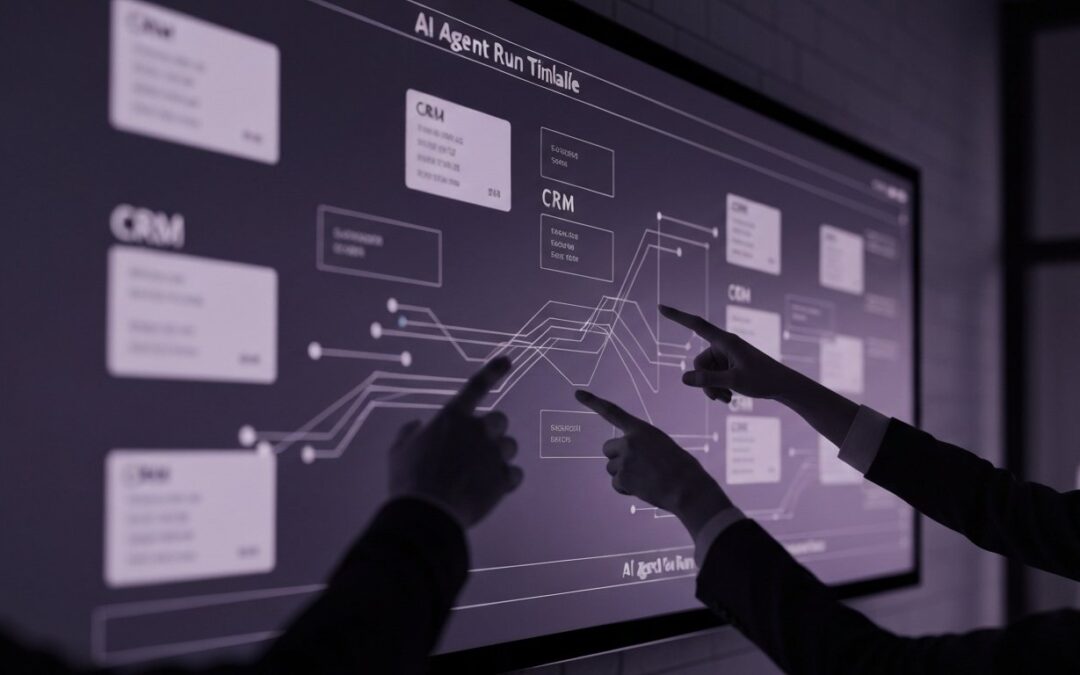Modern Business with AI Agent Solutions: Transforming the Future of Enterprise
In today’s rapidly evolving technological landscape, modern business practices are increasingly influenced by artificial intelligence. AI agent solutions have emerged as a transformative force, revolutionizing operations, customer experience, and competitive strategy. Companies across industries are leveraging these solutions to automate tasks, derive rich insights from data, and foster innovative decision-making. This article explores how AI-powered agents are reshaping modern business, discusses the benefits and challenges involved, and highlights success stories from industry pioneers. Modern business with AI agent solutions is not merely a trend but a strategic imperative for any enterprise looking to thrive in the digital age.
The Evolution of AI in Business
Artificial intelligence has come a long way from its early implementations, evolving from simple rule-based systems to dynamic, self-learning agents capable of complex decision-making. Initially, businesses used AI merely for data analysis or customer segmentation. Today, AI agent solutions are embedded in every aspect of business operations. For instance, AI-driven chatbots now provide instant customer support, manage social media interactions, and even offer personalized product recommendations.
This transformation is fueled by advances in machine learning algorithms, natural language processing, and deep learning architectures, all capable of processing vast volumes of data in real time. As businesses look to the future, integrating AI agents into operations is not a luxury but a necessity to stay competitive. This evolution paves the way for innovative practices and increased productivity across sectors.
Key Benefits of AI Agent Solutions
Enhanced Efficiency and Productivity
AI agent solutions shine at automating routine and repetitive tasks. Studies indicate that automation can significantly reduce operational costs while enhancing productivity. By delegating tasks such as data entry, scheduling, and customer inquiries to AI-powered agents, employees can concentrate on creative and strategic initiatives. Moreover, automation helps minimize human error, ensuring faster and more reliable operations.
Personalization and Improved Customer Experience
In the realm of customer service, AI agents have dramatically transformed how businesses interact with clients. Modern agents can analyze customer data to deliver personalized recommendations, tailored support, and predictive services. This high level of personalization boosts customer satisfaction and loyalty. Industries like e-commerce have seen significant improvements in conversion rates and repeat business after integrating AI agent solutions into their customer engagement strategies. Check out how AI Agent Solutions optimize interactions.
Data-Driven Decision Making
In today’s business environment, precision and speed in decision-making are essential. AI agents offer robust analytics capabilities that provide insights critical for informed decisions. By analyzing trends, forecasting demand, and optimizing inventory, AI solutions not only enhance operational efficiency but also provide a competitive edge. Interactive dashboards and real-time reporting tools integrating AI insights ensure more dynamic and accurate strategy formulation.
Scalability and Flexibility
Modern business landscapes require flexibility, and AI agents deliver by enabling scalable operations. Whether managing increased customer inquiries during peak periods or adapting to emerging market conditions, AI-driven systems can be seamlessly integrated into existing infrastructures. This modular design allows businesses to enhance performance without overhauling their systems.
Competitive Advantage in a Digital Era
Investing in AI agent solutions is a strategic move that provides a distinct competitive advantage. Enterprises that adopt these technologies early are better positioned to innovate and adapt, outpacing competitors who rely on traditional practices. The ability to analyze vast datasets, anticipate market trends, and respond dynamically to opportunities makes AI an essential component of modern competitive strategy.
A Glimpse into Future Trends
Integration with the Internet of Things (IoT)
The convergence of AI and IoT is set to revolutionize numerous sectors. AI agents that harness data from IoT devices can optimize operations in real time. In manufacturing, sensors monitoring equipment can trigger AI agents to predict maintenance needs, reducing downtime and prolonging machine lifespan. This interconnectivity paves the way for smarter factories, efficient supply chains, and superior resource management.
AI Agents in Cybersecurity
As businesses digitize, cybersecurity becomes increasingly critical. AI agent solutions are increasingly deployed to monitor networks, detect anomalies, and respond to threats in real time. The ability of AI to learn from incidents and adapt its defenses strengthens security infrastructures. The future of cybersecurity relies heavily on AI to manage complex threat landscapes, protecting both organizational data and customer information. For insights on cyber defense strategies, visit Forbes.
Human-AI Collaboration
The future of work is not about replacing human roles with AI but fostering collaboration between them. AI agents can process data at incredible speeds, while humans contribute creativity and strategic insights. This synergy leads to innovative breakthroughs and more efficient organizational practices. Companies investing in technologies that enhance human capabilities are likely to see substantial growth and resilience in challenging market conditions.
Challenges and Considerations
Integration Complexity
While AI agent solutions offer significant benefits, integrating these systems with existing business operations can be challenging. Organizations may face difficulties merging legacy systems with modern AI platforms. A careful roadmap for integration is essential to ensure new technology complements rather than disrupts established processes. Investing in training helps employees adapt and work effectively with advanced AI systems.
Data Privacy and Ethics
With the rise of AI comes pressing ethical considerations. As AI agents handle increasing amounts of sensitive data, ensuring this information is used ethically and in compliance with data protection regulations becomes paramount. Implementing robust cybersecurity measures and clear data handling policies is vital to maintaining customer trust and loyalty. For further reading on data privacy and ethics, explore articles on Harvard Business Review.
Cost and Resource Management
Implementing AI agent solutions can be resource-intensive. While long-term benefits often justify the costs, smaller enterprises might find the initial investment challenging. A gradual implementation strategy can be a practical solution to manage costs while still reaping significant performance improvements over time.
Success Stories and Real-World Applications
Global Retailers
Major retail chains have been pioneers in adopting AI solutions to optimize their operations. Automated inventory management systems, powered by AI, have reduced stockouts and overstocks, leading to substantial cost savings. For example, AI agents in supply chain optimization can predict consumer behavior and automate restock orders, thereby enhancing customer satisfaction and operational efficiency. Additional case studies can be found on renowned platforms such as MIT Technology Review and Wired.
Financial Institutions
The finance sector has also experienced a significant impact from AI agents. Banks and financial institutions leverage AI to analyze market trends, detect fraudulent transactions, and manage risk. These advanced systems enable personalized financial advice in real time. The combination of technology and financial expertise streamlines operations and provides customers with tailored experiences.
Healthcare Innovations
In healthcare, AI agent solutions improve patient care by assisting in diagnostics and administrative tasks. AI-driven diagnostic systems analyze medical images with high accuracy, while AI agents help manage patient records, schedule appointments, and optimize resource allocation. The transformative power of these technologies in healthcare underscores their potential to enhance both clinical outcomes and operational efficiency.
Looking Ahead: The Roadmap for Business Innovation
Strategic Planning and Investment
The future of business lies in proactive planning and strategic investments in emerging technologies. Companies must develop robust roadmaps that integrate AI agent solutions as a core element of digital transformation. Staying updated with technological advances and continuously evaluating new tools is essential for maintaining a competitive edge.
Collaboration and Partnerships
The successful integration of AI agents often depends on strong partnerships with technology providers and research institutions. Collaborative approaches can accelerate innovation and provide valuable insights. Alliances with academic institutions and industry leaders help shape scalable and effective AI solutions. Learn more about collaborative projects on Forbes to gain additional insights into technology partnerships.
Employee Empowerment and Training
For AI integration to succeed, employees must be equipped to work alongside these advanced systems. Comprehensive training and continuous learning programs are critical for fostering a culture of digital adoption. Empowered employees who effectively harness AI insights contribute significantly to organizational innovation and performance.
Technological Infrastructure and Cybersecurity
As businesses adopt AI agent solutions, investing in robust technological infrastructure becomes imperative. Cloud technologies, high-speed connectivity, and advanced data centers are crucial for supporting modern AI operations. Equally important is the implementation of secure frameworks and encryption techniques to safeguard sensitive data.
The Convergence of AI and Sustainability
Beyond operational efficiency, AI agent solutions are also driving sustainable business practices. For example, AI systems can optimize energy consumption in manufacturing, reduce supply chain waste, and support smart city initiatives. Integrating sustainability metrics into AI analytics allows businesses to align their operations with environmental goals and global initiatives.
Integration with Digital Marketing
Modern enterprises are also leveraging AI to transform their digital marketing strategies. AI agents can analyze customer behavior to target advertisements, segment audiences precisely, and forecast market trends. These data-driven approaches significantly improve marketing ROI. Innovative platforms now combine AI functionalities to optimize content and campaign performance.
Conclusion
AI agent solutions represent a significant leap forward in business operations, innovation, and customer interaction. Their capacity to streamline processes, offer personalized experiences, and deliver critical insights makes them an indispensable component of modern enterprise tactics. As technology advances and digital landscapes evolve, AI will continue to shape smarter, more efficient, and sustainable business strategies.
For businesses prepared to embrace the future, investing in AI is essential. By incorporating cutting-edge AI agents into everyday operations, companies can enhance efficiency, competitive advantage, and customer satisfaction. This blend of technology and strategic insight is paving the way for the next wave of business success in an increasingly digital world.
Dive deeper into AI innovations and discover more about advanced solutions on our Insights page. Further, stay informed by visiting reputable sites like MIT Technology Review and Wired for the latest trends in technology.






